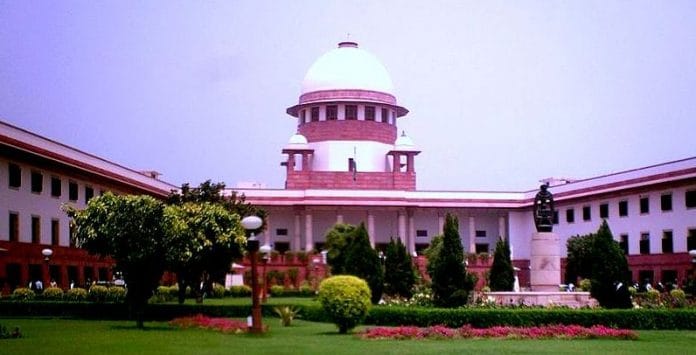New Delhi: The Modi government is at loggerheads with the Supreme Court collegium over judicial appointments once again, this time over the elevation of at least 10 lawyers as judges of the Allahabad High Court.
The Centre has reportedly put on hold the collegium’s recommendation to appoint the 10 lawyers on the grounds that they do not meet the minimum income qualification required for their elevation as judges.
The collegium comprising Chief Justice of India Ranjan Gogoi and Justices A.K. Sikri and S.A. Bobde had made the recommendation in February. Notably, in its resolution, the collegium had specifically noted that a few of the 16 lawyers it had recommended did not meet the minimum income criteria of Rs 7 lakh.
It had, however, proceeded to relax the requirements, asserting that it can do so “to a reasonable extent in cases where such recommendees belong to categories of SC/ST/OBC or represent the government in their capacity as standing /panel counsel before the courts”.
What do the rules say?
In March 2017, the then five senior-most judges of the Supreme Court — former CJI J.S. Khehar and justices Dipak Misra, Jasti Chelameswar, Ranjan Gogoi and Madan B. Lokur — had unanimously agreed on a revised Memorandum of Procedure (MoP) for judicial appointments. This was following the 2015 judgment in the National Judicial Appointments case.
The new MoP stipulates that each advocate should be an income tax assessee for 10 years before the recommendation and should have a minimum average net professional income of Rs 7 lakh per annum or more for the preceding five years. The reasoning for adopting Rs 7 lakh as the threshold is unclear.
In response, the Modi government recommended that the minimum income be fixed at Rs 5 lakh for smaller high courts and Rs 10 lakh for larger courts such as the ones in Allahabad, Bombay, Delhi, among others.
While the Centre is yet to notify the new MoP, it is understood that the collegium has been making recommendations on the basis of the new MoP.
Also read: Modi govt considering taking on SC collegium over 4 HC judges picked for elevation
Why is professional income a criteria at all?
The general belief among the legal community is that the minimum income criteria displays a lawyer’s commitment to the profession and his standing at the bar.
“Income criteria proves that the lawyer is in regular practice and that they have experience and a clientele,” Bar Council of India chairman Manan Kumar Mishra told ThePrint.
“I think the income criteria fixed currently is justified,” he added. “I don’t think it’s possible for any lawyer in the country to just take up pro bono work. Buying books or databases like Manupatra, all require money. I don’t think it’s possible for a lawyer to take up only pro bono work, have a clientele and be a good lawyer all at once,” he said.
“If a lawyer can’t make Rs 8-9 lakh per year, he cannot be said to be an established lawyer.”
Has govt red-flagged the income criteria? Has the criteria been relaxed before?
The Centre has, in the past, stalled elevation of lawyers to the bench on the grounds that the candidates do not meet the minimum income criteria. For instance, last year, the Modi government had found around 30 lawyers of a total of 126 candidates to be ineligible for appointments because they failed to meet the income criteria.
But in addition to the income criteria, the collegium also takes into account the age, academic qualifications, and experience of a lawyer, while also having a personal interaction with them before making the recommendation.
The collegium has relaxed the age criteria for candidates earlier, without according any particular reason. However, since it began uploading its resolutions on the Supreme Court website, this seems to be the first time when the collegium has admitted to the relaxation of income criteria for those belonging to the specific categories.
‘A self-defeating exercise’
The Supreme Court has itself, in the past, questioned the minimum income criteria, albeit in reference to lawyers’ income being considered for designating them as senior advocates.
Back in October 2017, while discussing the different criteria adopted by high courts across the country to designate senior advocates, a bench comprising Justices Gogoi, R.F. Nariman and Navin Sinha had called it a “self-defeating” exercise to specify a minimum income criteria at all.
“If merit and ability are to be the determining factors, in addition to standing in the Bar and expertise in any specialised field of law, we do not see why we should insist on any minimum income as a condition of eligibility,” the bench observed.
“The income generated by a lawyer would depend on the field of his practice and it is possible that a lawyer doing pro bono work or who specialises in a particular field may generate a lower return of income than his counterpart who may be working in another field of law,” it added.
The observations were made while the court was deciding on senior advocate Indira Jaising’s petition challenging the system of designating senior advocates in the Supreme Court. Jaising had alleged that the current system of designation was “arbitrary and contrary to the notions of diversity”, and sought guidelines to regulate them.
Allowing the petition, the apex court laid down a set of 11 pointers to be followed by the Supreme Court as well as all high courts while designation lawyers as senior advocates.
Also read: If collegium has its way, India could soon get its second Dalit CJI






